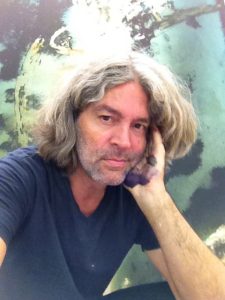
Jacques Gassmann was born on 28. 01. 1963 in Heidelberg
He lives in Würzburg and Berlin
Exhibitions in
China, France, Great Britain, Italy, Austria, Poland, Sweden, Switzerland, Spain, USA
Germany: Aachen, Augsburg, Berlin, Bad Kissingen, Brunswick, Celle, Eichstätt, Essen, Frankenthal, Fulda, Fürstenfeldbruck, Göttingen, Hamburg, Hanover, Hannoversch-Münden, Hattenheim, Holzkirchen, Karlsruhe, Cologne, Leipzig, Ludwigsburg, Lüneburg, Mainz , Miltenberg, Munich, Neustadt am Rübenberg, Oldenburg, Prenzlau, Rottenburg, Saalfeld, Salzgitter, Saarbrücken, Stolberg, Trier, Wiesbaden, Würzburg
Performances with: Hans Joachim Roedelius (composer, Baden / Vienna) Christopher Chaplin (composer, London) Elena Kats Chernin (compositor, Sydney) Matthias Neukirch (actor, Berlin DT, and Zurich Schauspielhaus) Judith Schnell (Domchor Limburg), Ecki Stieg ( Radio Hanover) Ralf Jaroschinski (ballet, Rio, Brazil), Frank Schablewski (lyric, Dusseldorf), Natalia Wojciechowska (ballet, Warszawa), Maciej Stendek (electronics, Gdansk), Hans Georg Vleugels (organ, Hardheim) and many more.
Chronologie
|
2018 2017 |
Warsaw , Agata Leguern Gallery Art Karlsruhe, gallery at Fritz Winter Atelier |
| 2016 | Museum Burg Miltenberg, Museum Burg Berlin, gallery Uterstaedt, Zeichnungen Art Karlsruhe und Köln Art Fair, gallery im Fritz Winter Atelier |
| 2015 | Berlin, gallery Uterstaedt Köln, Art Fair, gallery im Fritz Winter Atelier Berliner Liste (Art Week Berlin), gallery Uterstaedt Mijas / Malaga (E), wallpainting Art Karlsruhe, gallery im Fritz Winter Atelier Regensburg, St. Wolfgang, Diözesan-/Domschatzmuseum |
| 2014 | Köln, Art Fair, gallery im Fritz Winter Atelier Art Karlsruhe, gallery im Fritz Winter Atelier Leipzig, Spinnerei, Nsk-Folk-Art-Biennale Würzburg, Museum am Dom (Einzelexhibition) |
| 2013 | Poznan (PL) – Concordia, solo show Art Karlsruhe und Köln Art Fair, gallery im Fritz Winter Atelier |
| 2012 | Bologna Art Fair 2012 gallery Fu Xin (Shanghai) Karlsruhe Art Fair (Gal. im Fritz Winter Atelier, Diessen) Rom ,Art Fair, gallery Fu Xin (Shanghai) London ,Art Fair, gallery Fu Xin (Shanghai) |
| 2011 | Bologna Art Fair gallery Fu Xin (Shanghai) Rom ,Art Fair, gallery Fu Xin (Shanghai) Miltenberg , Museum Burg Miltenberg San Diego, Art Fair, gallery Fu Xin (Shanghai) Miami, Art Fair, gallery Fu Xin (Shanghai) |
| 2010 | Würzburg, Apokalypse, St Stephan Diessen gallery Fritz Winter, Auch ART Karlsruhe und ART Bodensee Würzburg, Apokalypse , Festival Endspiel 2011, im Stift Haug Berlin , Roderich , Performance Effeldorf gallery Döbele (gruppe) |
| 2008 | Schloss dagstuhl gallery at Hauptplatz , Fürstenfeldbruck Retrospektiv 5 Museums in Bad Kissingen Benediktushof Holzkirchen |
| 2006 | Müller Stiftung Hattenheim Collection |
| 2005 | Städtische gallery, Wroclaw(Breslau), PL Bischöfliche Akademie des Bistums Aachen gallery am Hauptplatz , Fürstenfeldbruck Katholische Akademie München |
| 2004 | Schloss Salder, Salzgitter, “Apocalypse” Burg Stolberg / Aachen “Apocalypse”, Basilika, Trier Kloster Bronnbach “Still a life” |
| 2003 | gallery Riedel, Frankenthal (Gruppe) Museum am Dom, Würzburg gallery Ricarda Fox , Essen Schloss Landestrost, Neustadt /rbge Stadt Augsburg, Säulenhalle, “ogrody“, “Flots”, “Diasporen”, gallery Hunziker, Zürich gallery Schlehn , Empede gallery Winter, Wiesbaden |
| 2002 | Nord LB Art, Hannover Kunstverein Genthiner Elf, Berlin Städtische Kunstsammlung Schloss Salder, Salzgitter Premio Suzzara, Mantova (Italy) |
| 2001 | Stadtkirche Karlsruhe, “Apokalypse” gallery Bernardi, Aachen Packhof, Hann-Münden, “Supersonic”, “Viriditas”, Kunsthalle Faust, Hannover, “Passion” |
| 2000 | Dom Fulda, “Apokalypse” Diözesanmuseum, Eichstätt Kloster Mariensee, “Viriditas” Ludwigskirche Saarbrücken,”Apokalypse” |
| 1999 | Künstlerhaus Göttingen , “Coasts” St. Thomas, Strasbourg (F), “Apokalypse” Heinrich-Heine-Haus, Lüneburg, “Coasts” |
| 1998 | St. Lamberti Kirche, Oldenburg Cathedrale, Fusterie…5 Orte in Geneve(CH) Diözesanmuseum, Rottenburg Kunstverein Celle Schloß , “Supersonic” |
| 1997 | St. Andreaskirche,Braunschweig,”Apokalypse” St. Johanneskirche, Saalfeld Schloß Ludwigsburg, Mon Repos Künstlerhaus Berlin |
| 1996 | Tyska Kirka, Stockholm (S) |
| 1994 | Domruine St. Marien, Prenzlau, Apokalypse |
| 1993 | gallery Schlehn, Neustadt/Rbg. gallery Borkowski, Hannover |
| 1992 | Marktkirche, Hannover, “Apokalypse” St. Michael, Würzburg, “Apokalypse” St. Michael, Lübeck, “Apokalypse” |
| 1991 | gallery Weber, Berlin wystawa szuki, Targi, Poznan (PL) |
| 1990 | gallery Stübler, Hannover |
| 1989 | Stadt Hannover, Ubahnhof Kröpke “Transfer” Lichtraum, München |
| 1987 | Orangerie Herrenhausen, Hannover (Gruppe) Kunstverein Hamburg, “Art of Piece Biennale” (beitrag) Lichtraum, München |
| 1986 | Sprengelmuseum Hannover, “Kunstbojen” Universität Hannover, “Weißmachen” |
| 1985 | Eisfabrik Hannover, “Messungen” Künstlerhaus Eisenturm, Mainz Köln U-bahn, “Rollendes Atelier” |
| 1983 -1988 | Performances in München, Freiburg, Villingen, Dortmund, Siegen, Oldenburg, Hannover, Bruxelles und Mainz u.a. |
Kunst am Bau
1993 Hannover, 3 Bühnenbilder für den Choreografen Ralf Jaroschinski
1994 Hannover, 4 Wandgemälde für den Techno-Club Tor 1
Kitzingen, St. Johannes”, Altarbild für die kath. Kirche,
1996 Veitshöchheim Ausmalung der St. Hedwig Kapelle,
Kitzingen, St, Johannes Kirche, Orgelgestaltung
1997 Hannover “Passion”, Altarbild, Neustädter Kirche,
Braunschweig, First Zentrale “Patagonia”, Gemälde (8x3m) & 19 Tafeln
1998 Runding, St. Andreas Kirche Orgelgestaltung,
Bad Tölz, Franziskanerkirche, Orgelgestaltung
1999 Schwabmünchen, Orgelgestaltung, St. Michael
2000 Schifferstadt Orgelgestaltung, St. Jakobus
Baunach,St. Oswald, Wandgemälde, 13 X 9 m
Straubing, “Boardercross”, Bilderserie für die Völkl-Zentrale
2002 Neustadt amRbGe ,Gestaltung der Kapelle, Krankenhaus
Völkl, Snowboards 03-04 Design
Krefeld, Alte Kirche Farbfassung der neuen Orgel
2004 Filderstadt St Stephanus, Orgelgestaltung und Kreuzweg
2006 Weil-der-Stadt,Mariakönigin, Orgelgestaltung
2007 Emmelshausen Orgelgestaltung
2008 Bad Brückenau,Orgelgestaltung
2009 Würzburg, Neumünster, Orgelgestaltung
Zeil a. Main, 2 Gemälde für die Orgel
2010 Würzburg , Neumünster und Dommusik, 2 Gemälde Passion 2mx2m
Chemnitz , Schlosskirche, Orgelgestaltung
2011 Würzburg, Augustinerkirche, Kreuzweg und 7 x 4 m Altargemälde
Würzburg, Dom, 3 grossformatige Gemälde für die Krypta
2013 Obertheres , 2 Flügel Altarbilder, Pfarrkirche St Kilian
2016 Volkersberg,Katholische Kirche, Altargemälde 2 St 500 x 100 cm
2017 Dingolshausen, St Laurentiuskirche , Wandgemalde ca 700 x 840 cm
und Wandgemälde ca 300 x 250 cm
2018 Baunach , 10qm Wandgemälde (erweiterung des Wandgemälde 2001)
Preise und Stipendien
2014 Kulturpreis Kunst und Ethos des Verlags Schnell und Steiner, Regensburg
1986 Arbeitsstipendium des Landes Niedersachsen
1990-91 Arbeitsstipendium der Ev. Hanns-Lilje-Stiftung, Hannover
1994 Erster Preis der Diözese Würzburg für den Entwurf der Ausmalung des Tonnengewölbes der Barockkirche Grafenrheinfeld
1997 Stipendium der Hermann Haacke Stiftung, Stuttgart
The Artist
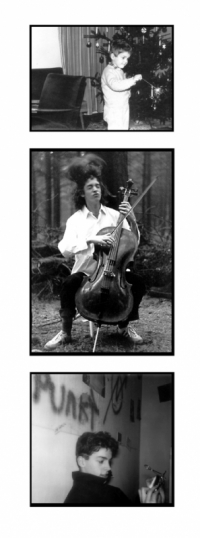 On 28.01.1963 Jacques Gassmann was born in Heidelberg as the son of the professor of theology Günther Gassmann and the interpreter Ursula Gassmann. Already in his early childhood, the boy experiences cosmopolitan influences, not only while growing up with his parents and two brothers in an international dorm until the age of six, but also as a four-year-old by a Danish student before drowning in the Neckar is saved. The relocation of the family in 1969 to Strasbourg in France became the cornerstone of Jacques Gassmann’s »amour francais« and a musical education parallel to the Lycée at the Conservatory of Strasbourg with the main instrument cello. By appointing his father as church president, Jacques Gassmann moved to the Lower Saxon town of Großburgwedel as a 14-year-old, where he graduated in 1982 with a degree in French and art. Even as a student Gassmann works in graphic studios, enthusiastic about the language of the images, first in comics and science-fiction-representations, but also of the opposites in graphics and art. First drawings on paper are created.
On 28.01.1963 Jacques Gassmann was born in Heidelberg as the son of the professor of theology Günther Gassmann and the interpreter Ursula Gassmann. Already in his early childhood, the boy experiences cosmopolitan influences, not only while growing up with his parents and two brothers in an international dorm until the age of six, but also as a four-year-old by a Danish student before drowning in the Neckar is saved. The relocation of the family in 1969 to Strasbourg in France became the cornerstone of Jacques Gassmann’s »amour francais« and a musical education parallel to the Lycée at the Conservatory of Strasbourg with the main instrument cello. By appointing his father as church president, Jacques Gassmann moved to the Lower Saxon town of Großburgwedel as a 14-year-old, where he graduated in 1982 with a degree in French and art. Even as a student Gassmann works in graphic studios, enthusiastic about the language of the images, first in comics and science-fiction-representations, but also of the opposites in graphics and art. First drawings on paper are created.
In 1979, at the age of 17, the gifted student developed performances with the theater director Bernd Seidel. Gassmann’s beloved cello is confiscated after too many public appearances in pedestrian zones by the parents and exchanged in protest of the young savage against synthesizers and rhythm machines. The New Wave band “Cache Sexe” is created with the participation of the later actor Andreas Jung and the photographer and designer Joachim Peters. After four years of experimental work on electronic music, the “Band of the Year” award and a record deal, “Cache Sexe” parted ways with 1983. Music remains indispensable alongside and in harmony with the art of Gassmann; The Artist himself composes pieces of music and soundtracks to his art, since he can not work without the sound.
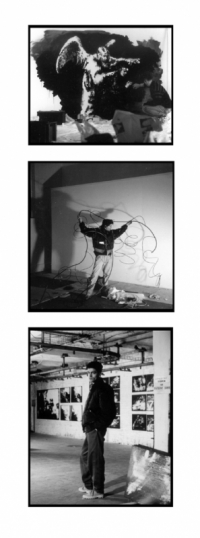
Starting in 1982, The Artist shows under the name “Jeunesse Dorée” in actions and exhibitions with the later fashion designer Uli Schneider his first wild, expressionistic works; a love formulated in art. Thanks to his charismatic charisma, Gassmann mobilized three hundred artists to the exhibition »1 in the same year. Present «as a counterpoint to the Herbstexhibitionen in the Kunstverein Hannover. In addition to painting, solo performances by the artist or in groups with »Jeunesse Dorée« in various parts of Germany and in Brussels follow until 1984. In order not to jeopardize his autonomy, Gassmann worked from 1982 to 1984 as a civil service provider in the elderly care Diakonie. He submits to no system and later decides against studying art. Success proves him right. In the following year, the Kunstsalon München shows expressionist works by the 22-year-old in Haus der Kunst.
In lavishly designed art books titled “Pictures of the Last Days” (1985), “Hommage à la Peau” (1986) and “Chaine Parlée” (1987), Gassmann uses black ink in gestural drawings to work on themes that directly concern him to be affected. So “homage à la peau” is dedicated to his cat Solange, who is run over in front of his eyes. In response to the demystifying debates on art, Gassmann’s lecture at the University of Hanover in 1986 and the “whitening” action that gives the name in two senses. He receives a working scholarship from the state of Lower Saxony.
“Violent”, large paintings and small, filigree ink drawings alternate in the same year until the artist turned away from 1987 for the time being by the large-scale painting with brushes, hands and other body parts and performances. In the same year, Gassmann will be showing works on the subject of »artists seeing gardens« in the Orangerie in Hanover and the Lichtraum in Munich. Retired, he works in a former horse stable in Langenhagen near Hannover.
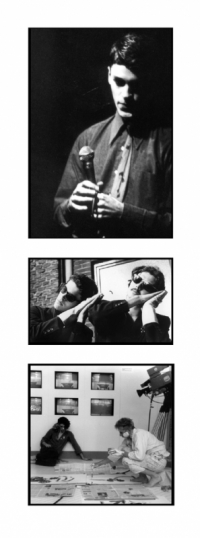
In the year of birth of his daughter Ophelia, 1989, Gassmann’s painting undergoes a structural change, henceforth a certain thematic association. “Natural Hazards” with thirty exhibits is the first thematic cycle and will be shown at the gallery Stübler in Hanover. Through experiments with ink and its pigments, exploring the possibilities of the medium of painting, The Artist developed in 1990 his special, later patented painting technique “Ogrody “. The mood-producing word in the Polish language means “garden,” both singular and plural. In Poland, Gassmann’s first “Ogrodys” are produced, without them being labeled as such by the artist at the time.
A scholarship from the Hanns-Lilje-Stiftung Hannover from 1990 to 1991 forms the basis for the monumental, 32-piece cycle of the “Apocalypse” as the painted, complete account of the history of the Apocalypse. In the following years, the cycle, also known as the “Revelation of John”, can be seen in Germany in Hanover, Berlin, Würzburg, Lübeck, Fulda, Saarbrücken, Karlsruhe as well as in Sweden in Stockholm, in Switzerland in Geneva and in France in Strasbourg.
Through travel, Jacques Gassmann experiences the development of his artistically translated themes. If a stay in the Caribbean decisive influence on the implementation of the apocalypse theme, so the artist used after the outbreak of the Gulf War in 1992 many conversations with pilots of the US – Airforce in San Diego, USA, as the introduction to the subject of his 1993 created cycle ” Supersonic “. Unlike the “Apocalypse,” Gassmann incorporates his personal interpretation into this work. »Supersonic« is exhibited in 1993 in the gallery Borkowski in Hanover, in 1998 in the Celler Castle and in 2001 in the Packhof in Hannoversch Münden. Also from the sacred subject area, but in the implementation differently, creates The Artist from 1993 to today after the presentation of mostly Ottonian crucifixes his two-part Passion pictures in the characteristic Ogrody green.
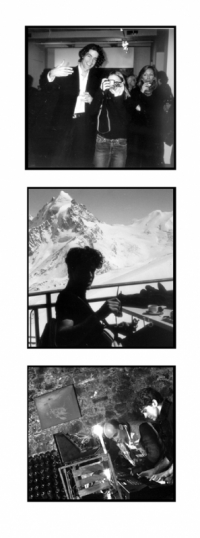
Starting in 1994, Gassmann will be responsible for various projects in the field of art in construction. Through the enthusiastic reception of the “Apocalypse” not only churches and chapels Jacques Gassmann provide their forum for the design of organs, altarpieces or vaults, but also houses such as the Conti AG 1992 in Hanover, the first travel agency 1997 with its headquarters in Braunschweig or the company Völkl 2000 in Straubing. For the design of the painting of the barrel vault of the baroque church Grafenrheinfeld, The Artist wins the first prize in 1994; as well for the creation of the altarpiece for the St. John’s Church in Kitzingen. Parallel to the various works in picture cycles, series of works and art-on-construction projects, Gassmann is always dedicated to the restrained, calm, sensitive subject of his »Ogrody» works.
In 1996, under the name »Viriditas«, anatomies and medicinal herb images were created that refer to the work of Hildegard von Bingen in the 12th century. In the following years, the works drawn on boxes are shown in the castle Ludwigsburg, in the monastery Mariensee and in the packing yard in Hannoversch Münden.
From the perspective of satellites created representations of coastal sections with the name »Coasts«. Cartographically accurately artistically translated, they show the artist’s ever more striking versatility. In the Künstlerhaus Göttingen and in the Heinrich-Heine-Haus in Lüneburg 1999 »Coasts« becomes accessible to the public.
The curiosity of Gassmann to circle around a topic again and again, without being exactly determined at the beginning of the work, makes the artist from 2000 become a snowboarder for his art and his experiences in the mountains for the company Völkl in the series »Boardercross« and the Artistically process the design of snowboards.
Gassmann’s approach to ever-new topics promotes his concentrated analysis of previous series and works. At the moment, The Artist is working on a new series of drawings and paintings that show very impressively the figurative and abstract elements in the painting of Jacques Gassmann.

